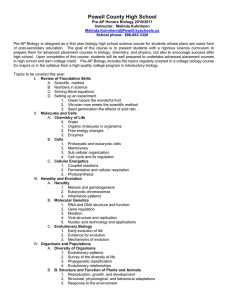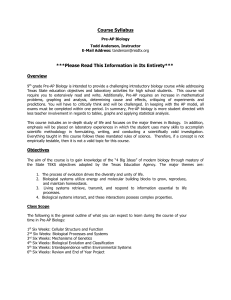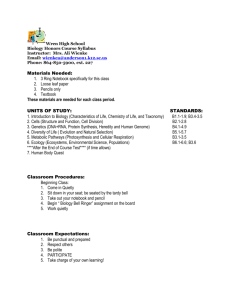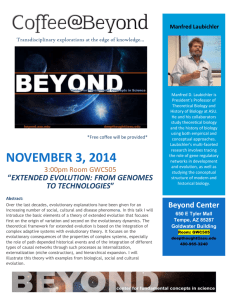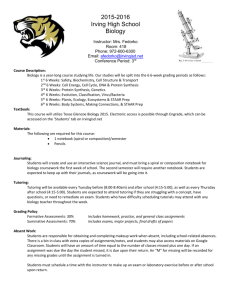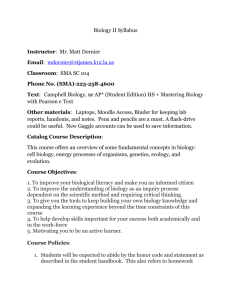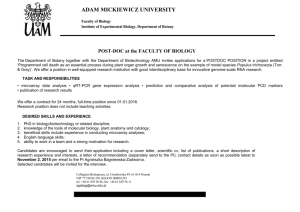AP Biology 2002/2003 - Powell County Schools
advertisement
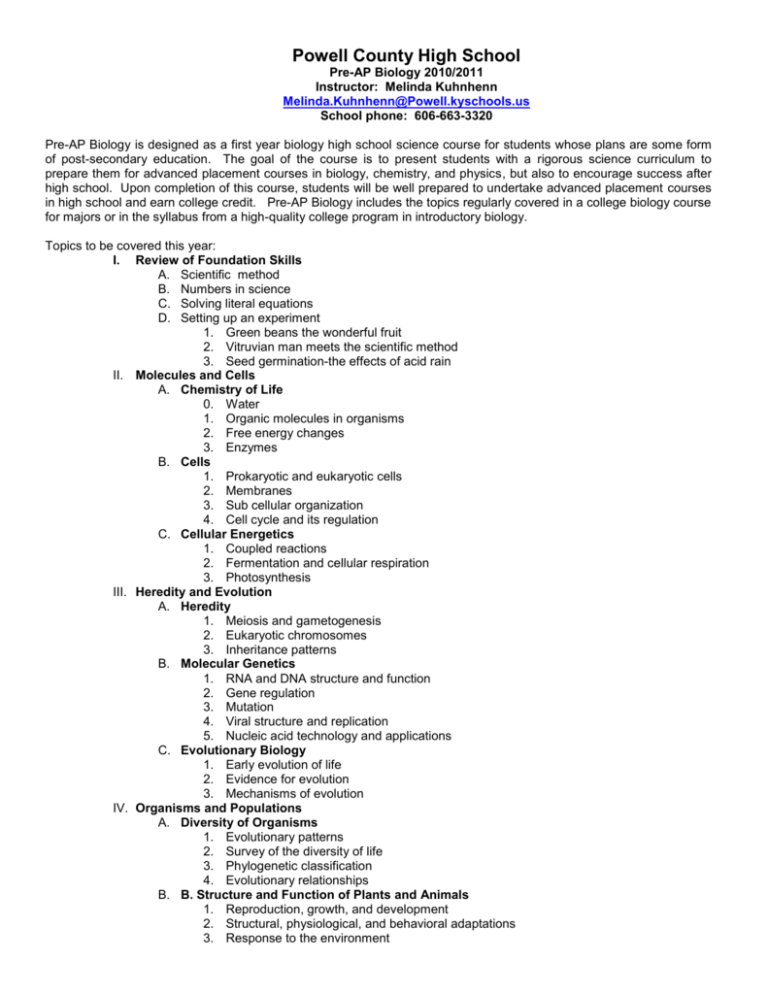
Powell County High School Pre-AP Biology 2010/2011 Instructor: Melinda Kuhnhenn Melinda.Kuhnhenn@Powell.kyschools.us School phone: 606-663-3320 Pre-AP Biology is designed as a first year biology high school science course for students whose plans are some form of post-secondary education. The goal of the course is to present students with a rigorous science curriculum to prepare them for advanced placement courses in biology, chemistry, and physics, but also to encourage success after high school. Upon completion of this course, students will be well prepared to undertake advanced placement courses in high school and earn college credit. Pre-AP Biology includes the topics regularly covered in a college biology course for majors or in the syllabus from a high-quality college program in introductory biology. Topics to be covered this year: I. Review of Foundation Skills A. Scientific method B. Numbers in science C. Solving literal equations D. Setting up an experiment 1. Green beans the wonderful fruit 2. Vitruvian man meets the scientific method 3. Seed germination-the effects of acid rain II. Molecules and Cells A. Chemistry of Life 0. Water 1. Organic molecules in organisms 2. Free energy changes 3. Enzymes B. Cells 1. Prokaryotic and eukaryotic cells 2. Membranes 3. Sub cellular organization 4. Cell cycle and its regulation C. Cellular Energetics 1. Coupled reactions 2. Fermentation and cellular respiration 3. Photosynthesis III. Heredity and Evolution A. Heredity 1. Meiosis and gametogenesis 2. Eukaryotic chromosomes 3. Inheritance patterns B. Molecular Genetics 1. RNA and DNA structure and function 2. Gene regulation 3. Mutation 4. Viral structure and replication 5. Nucleic acid technology and applications C. Evolutionary Biology 1. Early evolution of life 2. Evidence for evolution 3. Mechanisms of evolution IV. Organisms and Populations A. Diversity of Organisms 1. Evolutionary patterns 2. Survey of the diversity of life 3. Phylogenetic classification 4. Evolutionary relationships B. B. Structure and Function of Plants and Animals 1. Reproduction, growth, and development 2. Structural, physiological, and behavioral adaptations 3. Response to the environment C. Ecology 1. Population dynamics 2. Communities and ecosystems 3. Global issues Pre-AP students will be required to read four science articles and write an abstract on them. Also, any student participating in afterschool GIS training will be given extra credit. That credit can only be obtained by learning and working through software. Additional extra credit will be given for producing a research project using the softwares. I will also be available for training on the softwares listed above after school. There will be a certain amount of training needed to use them, but the softwares are free to download onto their home computer This course will meet the following: Academic Expectations 2.1 Students understand scientific ways of thinking and working and use those methods to solve reallife problems. 2.2 Students identify, analyze, and use patterns such as cycles and trends to understand past and present events and predict possible future events. 2.3 Students identify and analyze systems and the ways their components work together or affect each other. 2.4 Students use the concept of scale and scientific models to explain the organization and functioning of living and nonliving things and predict other characteristics that might be observed. 2.5 Students understand that under certain conditions nature tends to remain the same or move toward a balance. 2.6 Students understand how living and nonliving things change over time and the factors that influence the changes. Your Grade in This Class: In this class your grade will be determined by your performance on the following assignments: Assignments Percent of Final Grade Daily Work and Quizzes 20 % Labs and Lab Assessments 30 % Tests 50 % AS SOON AS POSSIBLE Mrs. Kuhnhenn’s website will contain extensive powerpoint notes used during class lectures. It is suggested that students print these notes out, reference these notes frequently, and utilize the notes to take additional notes during class lectures. Most quizzes will consist of multiple choice questions. Some labs will require multiple class periods to complete. Some students will find that they need to come in before and/or after school to complete data collection. All tests will mirror the AP Exam to prepare students for taking the AP Exam in the future. Most will include a multiple-choice section and a free response section. Often the free response is take home to save class time for lecture and lab. Study guides may be provided for student use and students should expect considerable time studying outside of class. For every class you need: Study Guide/Homework or other assignment necessary for class work. Pencil Blue or Black ink pen 3 ring binder dedicated to biology - organize by 6 weeks and include current 6 week calendar highlighter a good eraser colored pencils calculator TI 83/84 if possible, but these will be available when needed. Course Guidelines and Procedures Expectations at the beginning of class Enter lab ready to demonstrate knowledge of previous blocks topics including homework. When the bell rings, visiting stops, homework should be out, and you should be working on the warm up. Please work on the warm up quietly and hold all questions until discussion. Expectations for Teacher Directed Learning Students are expected to remain quiet and attentive during teacher directed learning. Group Work Expectations ALL members of a group are expected to participate equally and cooperate with their other group members. The group work area should be left as clean or cleaner than it was found. Please exhaust all other options (dictionaries, textbook, notes, peers, reference materials, etc.) before asking me for help. Keep discussions Biology related. The teacher reserves the right to rearrange and change group assignments if it is deemed necessary to facilitate an environment conducive to education. Individual Work Expectations During individual work (warm-up, quizzes, tests, etc.) talking is NOT allowed. Talking during these periods will be considered academic dishonesty and/or a disruption of the learning process. Don’t cheat. Don’t even contemplate cheating. Expectations for Dismissal Students are expected to clean up their work areas and be seated before they can be dismissed from the classroom. The teacher dismisses the class NOT the bell Late Work Policy A. Daily Work i. Daily Work is due when called for. ii. Late work is accepted with a maximum grade of 70%. (accepted until the date of the unit exam, only quality late work completed in tutorials is accepted) B. Major Work i. Major work turned in one class late earns a maximum of 70%. ii. Major work turned in two classes late earns a maximum of 50%. iii. There is no credit awarded for Major Work more than two classes late. Optional Projects There is an optional project every six weeks. It is due at the start of class on the due date and will not be accepted late. Extra credit is NEVER given at the end of the six weeks as a means to raise a less than acceptable average. Consistent effort is the best way to achieve acceptable grades. Miscellaneous Cell phones are NOT allowed out in the classroom. Food and Drinks are NOT allowed in the classroom (this includes gum). Restroom and water breaks – no passes during the first and last 10 minutes. Go as needed all other times, one at a time with the hall pass (subject to change....if you wander or disappear no more restroom pass) Individual grades will NOT be discussed during class time. Tutorials: If you feel you do not understand what we are doing, I will stay after school with you and work with you. Make an appointment with me. Please make sure you have a way home. Make Up Work: If you are absent and the absence is excused, you have one day for every day absent from class to turn in missed work. It is suggested that students make every attempt to get any missed work from a student in their same class but do not fail to contact the teacher to verify assignments. If a student is to be out for an extended period of time, parents should contact the counselor’s office to arrange for teachers to send home missed work. If you know in advance that you will be absent, ask the teacher for the assignments that you will be missing. Make up tests are given during tutorials and must be scheduled with the teacher. Make-up work will be posted on the PCHS Odyssey and on Mrs. Kuhnhenn’s Science Cove. NOTE: Once work, labs, study guides, etc. are on the PCHS website I will only give you one copy of your assignment. If you lose it, leave it at home, or otherwise don’t have it…I will not be mad, but I will not replace it. You must download and print a copy for yourself as soon as you can.
